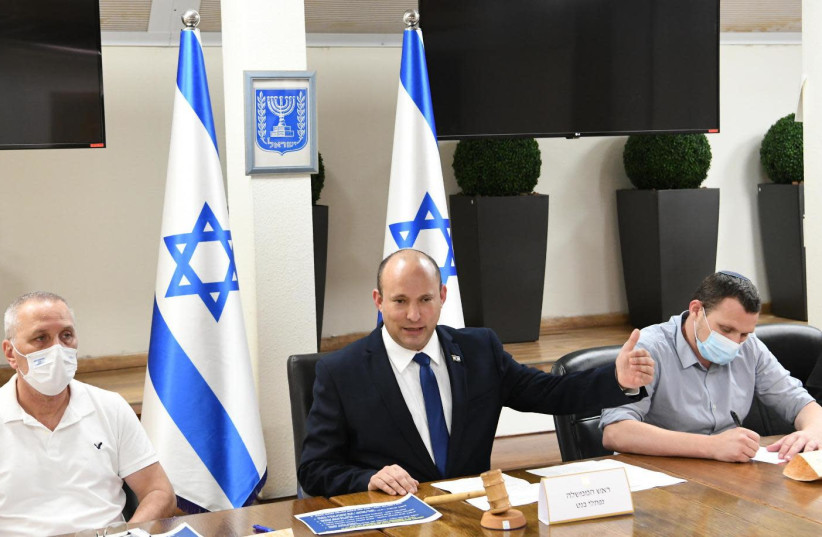Prime Minister Naftali Bennett learned in a hastily called press conference on Thursday that he had been right to avoid the media.
After weeks of complaints from journalists that he had been making statements about the coronavirus and not taking questions, over and over, he was asked cynical questions about his book How to Beat COVID-19: The Way to Overcome the Crisis and Lead Israel to Economic Prosperity.
The third time he was asked, his prepared answers had already been used up and he candidly admitted that he had received a dose of humility.
“The pandemic has given us all a lesson in modesty,” Bennett said.
Despite his high profile COVID task force, the book and the several position papers that Bennett put out during the first year of the crisis, what the last two months have shown him is that talking about coronavirus is much different than fighting it.
The novel coronavirus, SARS-CoV-2, has been in the world only since shortly before December 2019, making it a relatively new disease. Health experts are still learning how the virus and its mutations are going to behave. Doctors don’t really know how long long-COVID can last or what physical and mental implications the virus will have on some people’s bodies, even for the rest of their lives.
Politicians with no medical backgrounds are unlikely – and should not be expected – to have these answers either.
What epidemiologists do know is that mutations occur when a genome changes in some way during replication and that they are fairly common. When the infection rate is low, the number of mutations tends to be relatively small. Anytime the infection rate is enhanced, there will be an increase in errors.
Not all mutations necessarily have an impact on the nature of the virus, but some do – like the Delta variant. In this case, the mutation has increased the infectiousness of the coronavirus.
Bennett did not “manage in such a short time to spoil” opposition leader Benjamin Netanyahu’s success in the fight against COVID-19, as the former prime minister would like the public to believe.
Scientists have described to The Jerusalem Post how the Delta variant entered the country quickly in early June – before Bennett was even sworn in – and spread just as fast. The new prime minister was barely in office when the first Delta outbreak occurred in Israel.
But Bennett can be mocked for some of the extremist statements he made when he was an opposition MK and he had no responsibility for the wars against Iran, Gaza or COVID.
And he can also be blamed for taking too long to realize that now that he is prime minister, just as he cannot do some of those things he recommended in his previous positions, he will also have to take some of the actions he spoke out against.
In 2017, when Bennett was Education minister in Netanyahu’s government, he tweeted, “four rockets fired by Hezbollah at Israel is a declaration of war by the Lebanese government on Israel.”
By Saturday evening, it appeared that Israel’s response to the roughly 20 rockets that were fired by Hezbollah at Israel would be much more measured – as the IDF was recommending, at least for now.
Similarly, Bennett might also have to go against his repeated statements that Netanyahu’s locking down to stop the spread of COVID-19 was a failure.

THE MEDIA has highlighted what appears to be Bennett’s rapid policy flip-flopping from “living alongside the coronavirus” and beating COVID “without a lockdown” to “a closure may be unavoidable.”
But the sad reality is that the number of new cases is climbing at an alarming rate and experts are showing charts of predictions that put as many as 1,000 critically ill COVID-19 patients in hospitals by the end of the month and even more.
Bennett legitimately does not want to lock down because he understands the harm that such a move has on the economy.
The latest Israel Democracy Institute poll shows that the two things Israelis are most concerned about are the economy (31% of respondents) and COVID-19 (30%) – two challenges whose solutions are often contradictory.
Bennett, therefore, is stuck between a rock and hard place.
Now, his only solution is to somehow convince the 1.1 million eligible Israelis who have thus far shunned the vaccination booths to come out to get the jab.
“Throughout the pandemic, morbidity has only been successfully controlled by two means: vaccines or closure,” wrote Prof. Eran Segal, a computational biologist with the Weizmann Institute of Science who advises the government on COVID-19 and has Bennett’s ear, in a column for N12. “Because those 1.1 million were not vaccinated, the morbidity has not stopped.”
If Netanyahu deserves credit for convincing the majority of eligible Israelis to get inoculated in the world’s most stunningly rapid vaccination drive, then Bennett warrants the blame for failing for the last seven weeks to persuade these last Israelis to do their public health duty and vaccinate.
Perhaps this is because there are plenty of Israelis who do not even see the request of Bennett, a ruler with only six seats, as legitimate and don’t want to do what he says.
And an N12 weekend poll showed that 44% of Israelis say they prefer Netanyahu’s handling of the crisis compared to 23% who prefer Bennett’s.
These same Israelis are not disciplined and they are tired of following more and more rules.
To overcome Israel’s sad COVID-19 reality, Bennett will need more than just humility.
